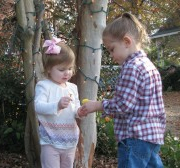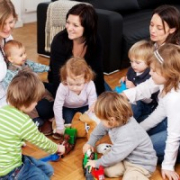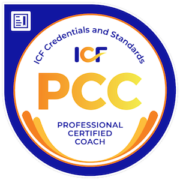How to Enable Your Kid’s Emotional and Physical Health and Well-Being

If you are a parent, one of the key thoughts that is never too far from your mind is ensuring that your kids grow up to be happy, healthy, well adjusted, and successful adults. I know for me, just about everything I say or do, as well as the experiences I see my daughter having in the world of school, peers, and teachers leaves me wondering about the potential impact these things will have on her later.
So, here is the second post in a 3-part series about the top seven life skills your children need to be happy and healthy throughout their lives. Last time, we talked about personal and online safety, which is a foundation for mental and physical health.
Today, we’re going to build on that with three more skills to work with your children on developing…so let’s get started.
Emotional Health And Self-Regulation
Emotional health and self-regulation are perhaps the most important and yet the most difficult skills to master. In part, this is difficult because it has so many layers and also because it has much more to do with what you DO rather than what you SAY as a parent. Let me explain.
Several years ago, I had a mom and dad come to see me with concerns about the emotional functioning of their 6-year-old daughter. She had a difficult time managing her anger and would have big angry outbursts when things didn’t go her way. She would just explode and they had a difficult time getting her to calm down. After reviewing the intake forms the parents had completed, I quickly realized why. When asked, “How does the mother handle anger?” the answer was “simmers then explodes”…when asked, “How does the father handle anger?” the answer was “simmers then explodes”. I asked the parents if they thought it was a coincidence that their daughter handled her anger in exactly the same way they did. They were stunned.
Kids generally don’t have built in “instruction manuals” to go on so they need guidance from parents to teach them how to manage their emotions. But, what many parents fail to consider is that their own behavior far outweighs any teaching they’re doing through words IF the words do not align with the actions. You see…kids are paying attention. Whether you like it or not, your kids are looking to you to SHOW them how to behave. So, don’t yell at them to calm down, TEACH them HOW. How do YOU calm down? What is the most appropriate way to calm down? When my daughter was 3, I realized that by getting angry when she was having a tantrum, I was only making the situation worse and escalating the “hotness” of the situation. I realized that as long as I stayed calm, I could help bring her down to match my response (instead of me matching hers). I then started teaching her how to calm herself by taking deep breaths…and helped her create a safe quiet space to be able to regroup and regain control. I know that when I am angry or upset, some time to myself to regroup usually works wonders, so why would I not give her the same opportunity?
Remind your kids that no one is perfect. Open up and share some of your own struggles. Apologize when you are wrong and don’t expect them to be experts at things YOU are still learning how to master yourself! Tell them mistakes are inevitable but that you can always figure things out together. This will help you form a deeper connection so they feel comfortable talking to you about their struggles.
Show them how to handle the daily stress and anxiety that comes with daily life. In general, you do that by modeling your own emotional well-being. Make sure they aren’t placing extremely critical and unrealistic expectations on themselves.
Help them recognize the symptoms of too much stress and ensure they have the tools and skills needed to cope. Deep breathing, meditation, physical exercise, talking things through instead of bottling them up, journaling, and using creative outlets like music or art will all help them maintain a more positive emotional and physical response to stress.
Most of all, reassure them it’s not a sign of weakness or failure if they have to reach out for help.
Importance Of Having Fun
Yes, I know what you’re thinking… “All my kids do is have fun! That’s the last thing they need help with!” But the reality is that teaching kids how to enjoy and take care of themselves is a skill like any other, and one that gets harder and harder as we grow into adulthood. One thing many kids expect is for their parents to entertain them. Having them learn how to play by themselves and how to initiate play with peers is vital life skills. Talk to them about how to start conversations with new peers. In this age of technology, scheduled play dates, and structured games and play, kids may fail to learn how to be creative and imaginative in their use of time and space.
Have you ever seen an adult who creates marvelous doodles while waiting for a meeting to begin? Or one who makes people laugh while waiting in a long line? Or one who can find the good in even the most difficult situation? Those are skills that they learned at some point during their lives and you can help your child learn to enjoy life in the moment as well. What fun creative skills do you have that you can share with your kids in an enjoyable way?
Physical Health and Self-Care
Self-care through personal hygiene, nutrition, exercise, and physical well-being starts in childhood, but not necessarily in the way you might think. Getting kids to eat all their veggies or teens to participate in an after-school sport is not the name of the game here.
Sure, eating right and exercising are important, but your ultimate goal is to set your kids up with positive feelings and associations about staying fit and eating well. That’s what will make them veggie lovers for life and keep them lacing up those gym shoes long after they move out of your house.
To develop their love of health and fitness, try the following:
- Make moving fun. Create games or challenges to get everyone moving. Have a dance party, run a relay race, or go on a family hike.
- Model the behaviors you want to see in your kids. Remember that if you say “broccoli is gross,” there’s no way they will want to eat it either! On the other hand, if they see you running a 5K, they will know they can do it too.
- Embrace their activity style. Not every kid is a natural born athlete, and that’s okay. Find what works for them, and gently encourage making it a habit.
- Get them cooking. Involving your kids in cooking and food preparation is one of the best ways to get them excited about nutritious food and keep the lines of communication open as they grow.
Teaching kids age-appropriate personal hygiene is also critical. Work with them on one skill to take care of themselves at a time – from getting dressed themselves right on through to doing their laundry themselves.
Next time, we’ll talk about the skills your child needs for a productive and stable life, so stay tuned. In the meantime, I would love your comments about the struggles you face when it comes to your kids’ emotional and physical well being.







